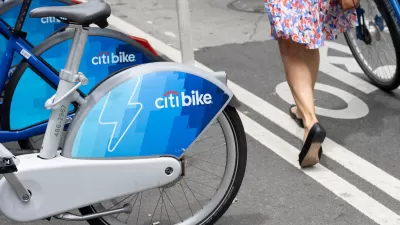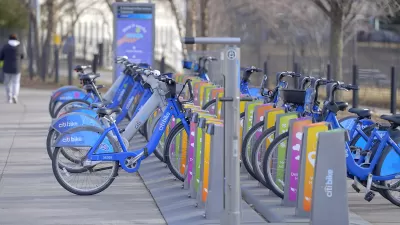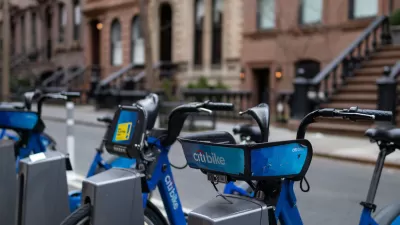Few details are available about just how troubled the financial situation is at the country’s most recognizable bikeshare program, but it’s possible that Citi Bike will need a cash infusion or a new model to stay in business.
Laura Kusisto, Eliot Brown, and Andrew Tangel share the distressing news about the financial situation of Citi Bike, New York City’s bikeshare program. Although few details are available, here’s what has been reported so far:
- “The program's leaders have approached officials in Mayor Bill de Blasio's administration about raising Citi Bike's rates…”
- “One issue is that Citi Bike has proved more popular than expected with annual users who generate comparatively little revenue. Some 99,000 people pay $95 a year plus tax to be able to use the bikes for 45 minutes at a time.”
- “The potential for far greater revenue, however, is with short-term users. Many of those were expected to be tourists, and they haven't used the bikes nearly as much as officials had anticipated, people familiar with the matter said.” According to the article, “managers don't believe it can survive if it doesn't become more appealing to tourists and expand to new neighborhoods.”
- Finding additional sponsors has proved challenging because the program has become so closely associated with its eponymous supporter, according to a person familiar with the matter.
The article has a lot more information and analysis of Citi Bike’s financial situation, including a discussion of whether Alta Bicycle Share, the company that runs Citi Bike through a subsidiary, will have to seek public money to stay afloat. So far, it seems, the program has only requested permission from the city to raise rates.
After initial delays, Citi Bike had been touted as a model of bikeshare success, while bikeshare programs in other parts of the country and in London have struggled.
FULL STORY: Citi Bike, Needing Millions of Dollars, Looks for Help

Maui's Vacation Rental Debate Turns Ugly
Verbal attacks, misinformation campaigns and fistfights plague a high-stakes debate to convert thousands of vacation rentals into long-term housing.

Planetizen Federal Action Tracker
A weekly monitor of how Trump’s orders and actions are impacting planners and planning in America.

In Urban Planning, AI Prompting Could be the New Design Thinking
Creativity has long been key to great urban design. What if we see AI as our new creative partner?

King County Supportive Housing Program Offers Hope for Unhoused Residents
The county is taking a ‘Housing First’ approach that prioritizes getting people into housing, then offering wraparound supportive services.

Researchers Use AI to Get Clearer Picture of US Housing
Analysts are using artificial intelligence to supercharge their research by allowing them to comb through data faster. Though these AI tools can be error prone, they save time and housing researchers are optimistic about the future.

Making Shared Micromobility More Inclusive
Cities and shared mobility system operators can do more to include people with disabilities in planning and operations, per a new report.
Urban Design for Planners 1: Software Tools
This six-course series explores essential urban design concepts using open source software and equips planners with the tools they need to participate fully in the urban design process.
Planning for Universal Design
Learn the tools for implementing Universal Design in planning regulations.
planning NEXT
Appalachian Highlands Housing Partners
Mpact (founded as Rail~Volution)
City of Camden Redevelopment Agency
City of Astoria
City of Portland
City of Laramie





























